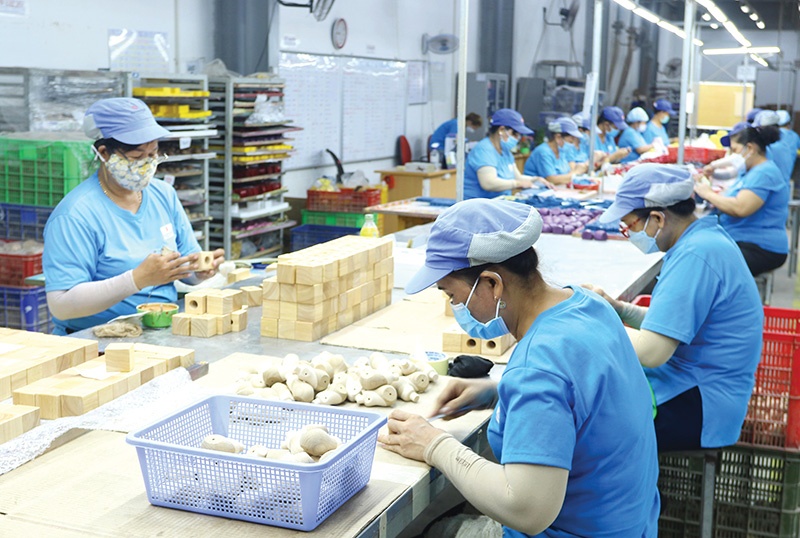Overtime adjustment to support operations
 |
| While overtime changes could help in the short-term, wages may need to rise as a long-term solution, Photo: Le Toan |
The resolution is considered a part of Vietnam’s effort in supporting the business community to recover operations after the pandemic, along with the government-proposed socioeconomic recovery programme worth nearly $12.5 billion over the next two years, which was approved in late January.
According to the draft resolution waiting for approval, the overtime cap will be adjusted 72 hours instead of the current 40 hours per month while simultaneously applying an overtime framework to 300 hours per year for all sectors, compared to the existing 200 hours. The new policy is planned to be valid by the end of December.
“The proposal to increase the overtime limit is calculated appropriately and based on comparisons with the overtime cap of other countries. The proposal is in line with the aspiration of enterprises and employees on the principle of harmonising benefits and sharing risks,” the Ministry of Labour, Invalids and Social Affairs’ (MoLISA) document notes.
A large volume of enterprises, especially in manufacturing, are expected to be satisfied after waiting for months for a ruling.
According to statistics from the MoLISA, millions of people laid off last year. Notably, the labour force in manufacturing and construction dropped by 254,000 people on-year, while the figure in the service sector dipped by 800,000 people. Many employers have been under strain because of the enormous increase in COVID-19 cases and subsequent isolation periods.
Tran Thi Lan Anh, general secretary of the Vietnam Chamber of Commerce and Industry, said, “The COVID-19 pandemic caused the labour force in terms of garments and footwear to decrease by 30-50 per cent. Numerous enterprises have lost the balance of product supply and consumption and if the disruption is prolonged, they will risk losing traditional customers. Now is the time for enterprises to accelerate to meet orders. Thus, the move will help manufacturers offset productivity and orders, which were delayed due to lack of labour.”
It is necessary to approve and take the policy into effect as soon as possible, Lan Anh stressed, “otherwise it will be valueless in supporting enterprises to recover their operations.”
Phan Hai, chairman and director of BQ Footwear Company, added, “Enterprises need to clearly tell the workers the importance of working overtime, and clearly state the roadmap for them to take the initiative. Between main working hours and overtime, it is also necessary for employees to rest and arrange overtime on weekdays so that employees still have time for their families on weekends.”
In contrast, it is acknowledged that the extension of the overtime cap is only a temporary solution. In the long term, the solution may be to increase wages for workers, according to Hai.
Many workers reflect that with the pandemic and climbing inflation, they are aware that they cannot maintain their lives with current salaries, so they are often tempted to leave their job to go back to their hometowns.
“The current minimum wage is too low, thus while adjusting working hours, employers should also consider increasing salaries immediately. Besides this, they also need to increase the minimum wage. In this way, workers are assured of sticking with the business with the current salary,” Hai said.
| Dao Ngoc Dung - Minister of Labour, Invalids and Social Affairs
The government has implemented solutions to support businesses and employees to promptly meet requirements of pandemic prevention and control, including the policy on overtime hours for certain sectors. Employees will be entitled to overtime pay equal to the salary worked on holidays, New Year, and night work. Many businesses are currently under stress when human resources cannot meet production and business requirements. This solution will help businesses overcome some difficulties and also contribute to stabilising their production and business while recovering and creating momentum for development. Through consultation with employees, the Vietnam General Confederation of Labour under the MoLISA also agreed with this draft resolution, and at the same time, it is necessary to study additional measures to ensure the welfare of employees who work overtime. However, it is necessary to ensure the health of workers. The MoLISA proposed to the National Assembly Standing Committee to consider raising the cap on monthly overtime to 150 per cent. At the same time, this new regulation will not apply to women who are pregnant, have children under 12 months of age, or do heavy and hazardous work. Anatolijus Fouracre-CEO Swiss Post Solutions Vietnam
Overtime, regardless of the industry, is something that an enterprise relies on to deal with unpredictable work volumes. While in some industries such volumes can be forecast quite accurately and labour arranged precisely to avoid most overtime, in many other industries work is less predictable, and enterprises rely on overtime to deal with short-term demand spikes. Overtime is also an alternative to hiring contractors or temporary staff. In many cases, hiring new or external staff for a short period of time would not be possible due to training and various other crucial requirements. Thus, overtime capabilities in Vietnam are necessary and allow an enterprise to be responsive to the market demands and hence more competitive. However, there must be clear safeguards so that enterprises are not using such limits as normal delivery for extended periods of time. Again, overtime is designed for amending peak capacity for short periods of time and not for ongoing staffing. Just as any rule can be abused, it is important to ensure employees are not sacrificed in the interest of profitability. There must be a balance between reasonable operational requirements and an employee’s willingness to work more and maximum use under the regulation. Winnie Lam-General secretary Hong Kong Business Association Vietnam
Our members in the manufacturing sector welcome the consideration of increasing allowable overtime hours from 40 to 72 per month. More flexibility will increase enterprise competitiveness. We have been lobbying authorities for years to consider more flexibility in the use of overtime during peak production seasons. The inability to ensure seasonal needs due to staff shortages would otherwise curb our members from further expansion, which is especially worrisome considering that Vietnam is clearly behind neighbouring countries. The total of 300 allowable overtime hours a year is still the lowest in the region by far. As Vietnam continues to be an attractive destination for foreign investment, the shortage of labour will continue to be an issue, if not detrimental. Workers also welcome the opportunity for more income in a familiar environment instead of taking on a second job where they work even more hours, causing harm to their health. It is much more desirable if they can earn an additional income in a one where their health and wellness can be monitored through proper scheduling and rostering. |
What the stars mean:
★ Poor ★ ★ Promising ★★★ Good ★★★★ Very good ★★★★★ Exceptional
Related Contents
Latest News
More News
- VNPAY and NAPAS deepen cooperation on digital payments (February 11, 2026 | 18:21)
- Vietnam financial markets on the rise amid tailwinds (February 11, 2026 | 11:41)
- New tax incentives to benefit startups and SMEs (February 09, 2026 | 17:27)
- VIFC launches aviation finance hub to tap regional market growth (February 06, 2026 | 13:27)
- Vietnam records solid FDI performance in January (February 05, 2026 | 17:11)
- Manufacturing growth remains solid in early 2026 (February 02, 2026 | 15:28)
- EU and Vietnam elevate relations to a comprehensive strategic partnership (January 29, 2026 | 15:22)
- Vietnam to lead trade growth in ASEAN (January 29, 2026 | 15:08)
- Japanese business outlook in Vietnam turns more optimistic (January 28, 2026 | 09:54)
- Foreign leaders extend congratulations to Party General Secretary To Lam (January 25, 2026 | 10:01)




 Tag:
Tag:




















 Mobile Version
Mobile Version